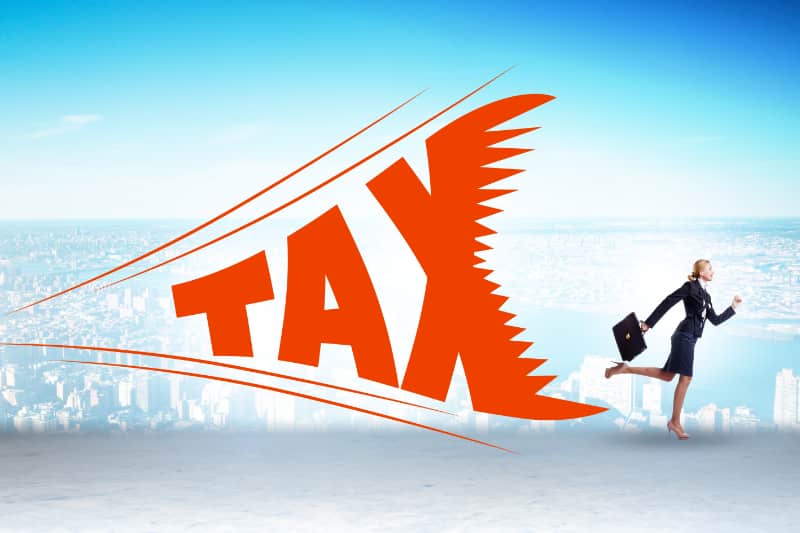HMRC Tax Investigations: Everything you need to know
In an ever-changing tax landscape, small to mid-sized businesses in the UK face increasing scrutiny from HM Revenue and Customs (HMRC). With a rise in investigations and the adoption of advanced technologies like artificial intelligence, understanding the intricacies of HMRC’s approach is more crucial than ever.
This article aims to demystify the process of tax investigations, offering insights into the types of investigations, recent trends, and how businesses can best prepare for this daunting experience.
Brief overview of HMRC tax investigations
 HM Revenue and Customs (HMRC) is the UK’s tax authority responsible for collecting taxes, administering benefits, and enforcing compliance. Tax investigations by HMRC are formal procedures where the tax authority examines the financial records of individuals and businesses to ensure that the correct amount of tax is being paid. These investigations can range from simple checks to more complex and in-depth inquiries.
HM Revenue and Customs (HMRC) is the UK’s tax authority responsible for collecting taxes, administering benefits, and enforcing compliance. Tax investigations by HMRC are formal procedures where the tax authority examines the financial records of individuals and businesses to ensure that the correct amount of tax is being paid. These investigations can range from simple checks to more complex and in-depth inquiries.
Importance for small to mid-sized UK businesses
For small to mid-sized businesses in the UK, an HMRC tax investigation can be a daunting experience. The process can be time-consuming, stressful, and potentially costly if discrepancies are found. Given the recent rise in the number of investigations, particularly targeting smaller enterprises, it’s crucial for business owners to understand what an HMRC investigation entails and how to prepare for one.
Types of HMRC investigations and recent trends
Understanding the landscape of HMRC investigations is crucial for businesses of all sizes. While larger corporations may be more familiar with Code of Practice 8 (COP8) and Code of Practice 9 (COP9) investigations, small to mid-sized businesses often face different types of scrutiny.
Aspect and full enquiries
Small businesses are commonly subject to either “Aspect” or “Full” enquiries. Aspect enquiries are more focused, often zeroing in on specific elements of a tax return, such as particular expenses or tax reliefs claimed. Full enquiries, on the other hand, are comprehensive and may involve a complete review of the tax return and the business records supporting it.
Compliance checks
Another form of investigation that small businesses should be aware of is “compliance checks.” These are not as intensive as full enquiries but are designed to ensure that your tax affairs are in order. These checks can be random or triggered by specific risk factors identified by HMRC.
COP8 & COP9 statistics for 2022-2023
HMRC’s Fraud Investigation Service (FIS) has been actively using Codes of Practice 8 and 9 to investigate tax compliance and fraud. The data for the financial year 2022 to 2023 provides valuable insights into the scale and focus of these investigations.
COP8 Investigations
- Total on Hand: 1,121
- Opened in Year: 674
- Closed: 545
- Interest (£m): 7.9
- Penalties (£m): 6.4
- Total Yield (£m): 72.4
COP9 Investigations
- Total on Hand: 2,181
- Opened in Year: 417
- Closed: 661
- Interest (£m): 8.1
- Penalties (£m): 14.8
- Total Yield (£m): 89.2
Implications for small to mid-sized businesses
The data shows a significant number of COP8 and COP9 investigations are ongoing, with hundreds opened and closed within the last financial year. The yield collected from these closed cases amounts to £72.4 million for COP8 and £89.2 million for COP9, including interest and penalties. This underscores the importance for businesses to be vigilant in their tax affairs, as HMRC is actively using these codes to investigate and reclaim lost tax revenue.
While the focus of COP8 and COP9 investigations is often on larger corporations or high-net-worth individuals, the increase in staffing and reclaimed amounts suggests that HMRC is becoming more aggressive in its efforts across the board. Small businesses contribute an estimated £13.4 billion to the tax gap, making them a likely target for increased scrutiny.
By understanding the types of investigations and being aware of the latest trends, small to mid-sized businesses can better prepare for the possibility of HMRC scrutiny.
The rise in HMRC investigations
Over the past couple of years, HMRC has been ramping up its efforts to ensure tax compliance, especially among small to mid-sized businesses. Recent statistics indicate a significant uptick in the number of investigations. For instance, HMRC’s investigations into individuals and small businesses raised a staggering £5.7 billion in the fiscal year 2021/22, marking a 54% increase from the previous year. This isn’t just a random occurrence; it’s part of a broader trend that’s been gaining momentum.
What’s behind the surge?
The government has been increasingly focused on closing the tax gap—the difference between the amount of tax that should be paid and what is actually collected. Small businesses and freelancers have found themselves under the microscope more than ever, with a 21% rise in investigations targeting this demographic. It’s clear that HMRC is casting a wider net, and no one is immune.
What triggers an investigation?
Understanding what might trigger an investigation can help you steer clear of unwanted attention from HMRC. Common triggers include significant fluctuations in income, inconsistencies between different tax returns, and late or incomplete submissions.
Preventive measures: What to watch out for
If you’re a small business owner, there are specific areas you should pay close attention to in order to minimise the risk of an investigation. Accurate record-keeping is your first line of defence. Make sure all transactions are documented and that you’re declaring all forms of income. Employing the services of a reputable accounting firm can also go a long way in ensuring that your tax affairs are in order.
 The investigation process
The investigation process
When HMRC decides to investigate a business, it’s not a process to be taken lightly. The investigation can be initiated in various ways, such as random selection, specific triggers, or even a tip-off. Once you’re on HMRC’s radar, the process unfolds in several stages, starting with an initial letter of inquiry. This is followed by a request for specific financial documents, which could range from bank statements to invoices and payroll records.
The depth of the investigation can vary. Some are relatively straightforward, requiring only basic documentation to verify the tax returns. Others can be more invasive, involving interviews and a thorough examination of your business operations. It’s a process that can last anywhere from a few months to several years, depending on the complexity and the level of cooperation from the business being investigated.
The key takeaway here is that an HMRC investigation is a serious matter that requires immediate attention and thorough preparation. Ignoring or delaying your response to HMRC’s inquiries can lead to penalties and further complications.
Data utilised by HMRC
In today’s digital age, HMRC has access to an unprecedented amount of data to aid in their investigations. They utilise around 55 billion items of data from various sources, including banks, property records, and even social media. This data-driven approach allows them to create a comprehensive profile of taxpayers, making it increasingly difficult to hide any discrepancies.
What’s more, HMRC employs advanced data analytics and artificial intelligence to sift through this massive amount of information. These technologies enable them to spot inconsistencies or anomalies that might warrant a closer look. For instance, if your lifestyle appears to be more lavish than what your declared income would suggest, that could raise a red flag.
For businesses, this means that the bar for meticulous record-keeping has been raised even higher. It’s not just about keeping your books in order; it’s about ensuring that all your financial activities are consistent across the board. This level of scrutiny may seem overwhelming, but it underscores the importance of having a robust accounting system in place.
Penalties and consequences
If you find yourself at the receiving end of an HMRC investigation and discrepancies are discovered, the consequences can be severe. Financial penalties are the most immediate concern. These can range from a percentage of the unpaid tax for minor errors, all the way up to 100% of the tax owed for serious cases of fraud or evasion.
But the repercussions don’t stop at financial penalties. A prolonged investigation can take a toll on your business operations. The time and resources spent on gathering records, attending interviews, and seeking legal advice can be disruptive. In extreme cases, criminal charges could be brought against the business owners, leading to potential imprisonment.
It’s not just about the here and now, either. An HMRC investigation can have long-lasting effects on your business reputation. Clients and suppliers may become wary of engaging with a business that has been under investigation, which can have a domino effect on your future dealings and growth prospects.
The gravity of these potential outcomes makes it imperative for businesses to take HMRC investigations seriously. It’s not just a matter of paying what you owe; it’s about protecting the integrity and longevity of your business.
How to prepare and respond
Being the subject of an HMRC investigation can be a nerve-wracking experience, but preparation and a proactive approach can make all the difference. The first step is to ensure that your financial records are in impeccable order. This includes not just your tax returns, but also invoices, bank statements, payroll records, and any other financial documents that could be scrutinised.
 If you receive that dreaded letter from HMRC, don’t panic. The worst thing you can do is ignore it. Respond promptly and consult with an accounting firm experienced in handling tax investigations. They can guide you through the process, helping you understand what documents you’ll need to provide and what questions you might have to answer.
If you receive that dreaded letter from HMRC, don’t panic. The worst thing you can do is ignore it. Respond promptly and consult with an accounting firm experienced in handling tax investigations. They can guide you through the process, helping you understand what documents you’ll need to provide and what questions you might have to answer.
Legal advice is also invaluable. Tax law is complex, and the stakes are high. A legal advisor can help you navigate the intricacies of the law and ensure that you’re taking the right steps to resolve the investigation as smoothly as possible.
Lastly, communication is key. Keep an open line with HMRC throughout the investigation. This not only helps in resolving issues more quickly but also shows that you’re committed to compliance, which could work in your favour.
New initiatives by HMRC
HMRC is continually evolving its methods and strategies for tax collection and compliance. One of the latest initiatives is the increased use of data analytics and artificial intelligence to identify potential cases for investigation. This means that HMRC is not just relying on traditional triggers but is also using predictive algorithms to identify high-risk taxpayers.
Another noteworthy development is the focus on sectors that are traditionally cash-heavy, such as hospitality and construction. HMRC is increasing audits in these sectors, aiming to clamp down on undeclared income and tax evasion.
Additionally, HMRC has been collaborating more closely with international tax authorities. With the advent of the Common Reporting Standard (CRS), information sharing between countries has become more streamlined, making it harder for businesses to hide income or assets abroad.
These initiatives indicate a more proactive and technologically advanced approach by HMRC, which has implications for how businesses should prepare for potential investigations. It’s a clear sign that HMRC is upping its game, and businesses need to do the same to stay ahead of the curve.

HMRC’s use of AI in tax investigations
In an era where data is king, HMRC is not lagging behind. The tax authority has embraced advanced technologies, including artificial intelligence (AI), to enhance its capabilities in identifying tax evasion and avoidance. One of the most notable tools in HMRC’s arsenal is the ‘Connect’ AI system.
What is ‘Connect’?
The ‘Connect’ system is a sophisticated AI tool that holds an astonishing 55 billion items of taxpayer data. It uses this data to create comprehensive profiles of taxpayers, both individuals and businesses. The system pulls in data from a myriad of sources, including but not limited to, financial institutions, property transactions, and even social media.
How does it work?
‘Connect’ employs advanced data analytics to sift through the massive amount of information it holds. By using predictive algorithms and pattern recognition, it can identify inconsistencies or anomalies in tax returns and financial activities. This allows HMRC to flag potential cases for further investigation, making the process more efficient and targeted.
Implications for small businesses
While the ‘Connect’ system is incredibly powerful, it’s not infallible. It’s crucial for small to mid-sized businesses to maintain meticulous records to ensure that their financial activities are consistent across the board. Any discrepancies, even if unintentional, could trigger the AI’s algorithms, leading to an unwanted investigation.
By understanding how HMRC utilises AI in its investigative processes, businesses can better prepare themselves for the digital age of tax compliance. It’s a clear sign that the tax landscape is evolving, and businesses must adapt to stay ahead of the curve.
Final thoughts
Navigating the complexities of an HMRC tax investigation can be a daunting task, especially for small to mid-sized businesses. The rise in investigations, coupled with HMRC’s increasingly sophisticated methods, makes it more important than ever to be proactive in managing your tax affairs. From understanding what triggers an investigation to keeping meticulous records and seeking expert advice, preparation is your best defence.
But it’s not just about avoiding penalties or navigating an investigation smoothly. It’s about safeguarding the integrity and future of your business. With HMRC’s new initiatives and technological advancements, the landscape of tax compliance is changing rapidly. Staying informed and prepared is not just a good business practice; it’s a necessity in today’s ever-evolving regulatory environment.
So, if you haven’t already, now is the time to consult with an accounting firm like TaxAgility that specialises in tax investigations to ensure that your business is compliant and prepared for any scrutiny that may come your way. After all, it’s better to be safe than sorry.
How AI is Helping HMRC to Collect Taxes and Crack Down on Tax Evasion
HMRC has been developing its AI capabilities for a number of years. In 2016, it launched the AI Lab, which is a team of experts who are working to develop new AI-based tools and techniques to help HMRC collect taxes more effectively. In this article, we explore some of the ways HMRC is using its new tools to crack down on small business tax evasion.

The AI Lab has made a number of significant achievements in recent years. For example, it has developed an AI-based tool that can automatically detect fraudulent tax returns. This tool has been used to identify millions of pounds of fraudulent tax claims.
AI Lab is also working on developing AI-based tools to help HMRC with other tasks, such as identifying businesses that are at risk of tax evasion and targeting businesses for audits.
It appears that HMRC is committed to using AI to improve its ability to collect taxes and to crack down on tax evasion. The AI Lab is playing a key role in this effort, and it is likely that HMRC will continue to develop its AI capabilities in the years to come.
Here are some of the ways in which HMRC has been developing its AI capabilities:
- Investing in research and development. HMRC has invested heavily in research and development of AI technologies. This investment has led to the development of a number of innovative AI-based tools and techniques.
- Partnering with academia and industry. HMRC has partnered with academia and industry to access expertise and resources in AI. This collaboration has helped HMRC to accelerate the development of its AI capabilities.
- Scaling up its AI capabilities. HMRC is scaling up its AI capabilities by training more staff on AI technologies and by investing in infrastructure to support AI-based processes.
HMRC’s investment in AI is a significant development that has the potential to transform the way that HMRC collects taxes. By using AI, HMRC can become more efficient and effective in collecting taxes, and it can crack down on tax evasion more effectively.
HMRC cracks down on small business tax evasion with AI
Small businesses are a vital part of the UK economy, but they are also at risk of tax evasion. The UK tax authority, HMRC, is using artificial intelligence (AI) to crack down on small business tax evasion. This is a significant development and it’s important for small business owners to be aware of the risks and to take steps to protect themselves and thus avoid the prospects of a tax investigation.
Why small businesses need to know this
There are a number of reasons why small businesses need to be aware of HMRC’s use of AI to crack down on tax evasion.
The use of AI is a significant development that small business owners need to take note of. AI is a powerful tool that can be used to analyse large amounts of data and identify patterns of suspicious activity.
This means that HMRC is now able to identify businesses that are at risk of tax evasion much more easily than in the past.
Small businesses are a target for tax evasion. Small businesses are often seen as being less likely to comply with tax laws than larger businesses. This is because small businesses may have fewer resources to devote to tax compliance, and they may be more likely to be run by individuals who are not familiar with tax laws.
The penalties for tax evasion are severe. If a small business is caught evading tax, it could face significant penalties. These penalties could include fines, asset seizures, and even imprisonment.
How AI is identifying businesses at risk of tax evasion
AI is being used to analyse data on businesses to identify patterns of suspicious activity. For example, AI can be used to identify businesses that are reporting unusually high expenses or that are making large cash payments.
Here are some examples of suspicious activity that AI can identify in businesses that are:
- Reporting unusually high expenses, such as travel and entertainment expenses.
- Making large cash payments, especially for items that are typically paid for by check or credit card.
- Reporting inconsistent income and expenses from year to year.
How AI is assessing the risk of tax evasion by businesses
AI is being used to assess the risk of tax evasion by businesses. This risk assessment takes into account a number of factors, such as the business’s size, industry, and location.
Here are some factors that HMRC considers when assessing the risk of tax evasion:
- The size of the business. Larger businesses are more likely to be audited by HMRC than smaller businesses.
- The industry of the business. Some industries, such as construction and hospitality, are more prone to tax evasion than others.
- The location of the business. Businesses that are located in areas with a high concentration of tax evasion are more likely to be audited by HMRC.
How AI is supporting HMRC’s enforcement activities
AI is being used to support HMRC’s enforcement activities. For example, AI can be used to identify businesses that are not complying with tax laws and to generate reports on tax evasion.
Here are some ways that AI is being used to support HMRC’s enforcement activities:
- AI can be used to identify businesses that are not filing tax returns or that are filing late.
- AI can be used to identify businesses that are underreporting their income or overstating their expenses.
- AI can be used to generate reports on tax evasion that can be used by HMRC to target businesses for audits.
Small business tax evasion
Here are some simple statistics which help show the size of the problem HMRC faces and why it is using all the tools available to it to crack down.
The total cost of tax fraud and evasion in the UK is estimated to be £32 billion per year.
Small businesses are responsible for around half of all tax fraud and evasion in the UK.
The most common types of tax fraud and evasion by small businesses include:
- Underreporting income
- Overstating expenses
- Claiming false expenses
- Not filing tax returns
The penalties for tax fraud and evasion can be severe, including fines, asset seizures, and even imprisonment.
What this means for small business owners
As a small business owner, it’s important to be aware of the fact that HMRC is using AI to crack down on tax evasion. This means that you need to be more careful than ever to ensure that you are complying with all tax laws.
Here are a few things you can do to protect yourself from being caught up in HMRC’s AI crackdown:
- Keep good records: It’s important to keep good records of all of your business income and expenses. This will help you to ensure that you are able to declare your income correctly and that you are not claiming false expenses.
- Keep all of your receipts, invoices, and other documents related to your business.
- Organise your records in a way that makes them easy to find.
- Keep your records for at least seven years.
- Get professional advice: If you are unsure about your tax obligations, it’s important to get professional advice from an accountant or tax advisor.
An accountant or tax advisor can help you to understand your tax obligations and to ensure that you are complying with all tax laws.
Be aware of the risks: Tax evasion is a serious offence and it can lead to penalties, asset seizures, and even prosecution. It’s important to be aware of the risks of tax evasion and to take steps to avoid it.
Penalties: HMRC can impose penalties for tax evasion. The amount of the penalty will depend on the severity of the offence.
Asset seizures: HMRC can seize assets, such as bank accounts, cars, and homes, from businesses and individuals who have evaded tax.
Prosecution: In some cases, HMRC may prosecute businesses and individuals who have evaded tax. If convicted, individuals can face up to seven years in prison.
How TaxAgility has helped clients avoid tax evasion issues
As a specialist small business accounting firm in Richmond and Putney, we’ve been on hand to assist our clients ensure they meet all their tax reporting obligations in a timely manner. We are also able to spot simple and more elaborate issues in their day-to-day operations and tax reporting, that may bring them to the attention of HMRC, often quite inadvertently so.
Don’t hesitate to contact TaxAgility, if you’re concerned that mistakes may have been made and you are worried about HMRC’s response. Call today on: 020 8108 0090.
What are the differences for tax purposes between domiciled and non-domiciled status?
A few months ago we published a case study concerning HMRC enquiring about foreign income. This can happen if you are a foreign national and are now living and working in the UK. An area we didn’t touch on was associated with how HMRC views your domiciliary status. The recent news about Rishi Sunak’s wife has highlighted this is somewhat complex and often misunderstood area of tax law. In this short post we’d like to help explain what it means to be ‘domiciled’ or ‘non-domiciled’ where tax in the UK is concerned.
What does ‘domicile’ mean?
 In a nutshell, ‘domicile’ refers to that country a person treats as their main or permanent home. Also, it concerns where they actually live and maintain a ‘substantial’ connection with.
In a nutshell, ‘domicile’ refers to that country a person treats as their main or permanent home. Also, it concerns where they actually live and maintain a ‘substantial’ connection with.
If you read our article on “Living Overseas - Do I Need Top Pay Tax if I Leave The UK?”, then you’ll be familiar with the tests that HMRC apply to decide how to treat your current tax residency status. As part of the Automatic UK Test, HMRC looks at your sufficient ties to the UK and whether they point to whether or not you’ve actually left the UK or still have reasons to come back, perhaps regularly. These tests help HMRC determine if you are legitimately living overseas for tax purposes or if perhaps you’re trying to avoid paying UK taxes by staying out of the country for 183 days a year.
Domicile of origin and domicile of choice.
Where UK tax law is concerned, there are three types of domicile - domicile of origin, domicile of choice and domicile of dependence. In the UK, you acquire domicile or origin at birth through your father, although this doesn’t mean the country the person was born in, but most often does. So, if your father is from India, India is your domicile, unless you choose otherwise.
Domicile is different to residency. In UK common law, every individual has one domicile, you can’t have two or have no domicile.
Your domicile of origin cannot be lost easily. Simply by moving overseas for an extended period, becoming a tax resident here or elsewhere, does not automatically remove for domicile status.
However, domicile of choice is a little harder to consider. Take for instance, a UK national. If they move abroad ‘permanently’ to settle in another country. Permanent means ‘indefinitely as it is really up to the person concerned, as is domicile of choice. It comes down to intention’s: if the new country will be their permanent residence, will they have family interests there, a business or other social interests. Do they own a property in that country? And, what about the existence of a Will and where that was created.
It’s quite a tricky area, as there are many variables and many ways to interpret somebody’s intentions. Hence, arguments with HMRC can arise and as always, you’ll need to prove your ‘innocence’ in the matter.
Domicile of dependence is for children under the age of 16 and their domicile will follow that of the person on whom they are legally dependent. However, it must be noted that if the domicile of the parent or legal guardian changes, the child will automatically acquire the same domicile and the child’s domicile of origin will be displaced.
[Read more about what happens if HMRC make enquires about you overseas income]
Important tax issues to consider
It is quite understandable why somebody would not wish to give up their domiciliary, as there may be intentions to return home, the UK being transitory, even though it may appear as somebody’s permanent home.
Take for instance somebody from India who has been living and working in the UK for many years. Their family may still predominantly be in India. They may’ve family business interests there too, or even own property there. In short, there may still be clear intent to return one day.
This means that although a foreign national living and working in the UK maybe a ‘tax resident’ and pay taxes on the income generated through their work here, their ‘non-domicile’ status will mean that their worldwide income does not have to be reported in the UK, as that will no doubt be payable to the tax authorities in the domiciled country. This highlights two options for non-domicile tax residents - being taxed on an arising or remittance basis
Taxed on an ‘arising’ or ‘remittance’ basis
If you are ordinarily considered as UK domiciled and a tax resident, then you are charged on an arising basis. This means that you pay tax on your worldwide income and you’re allowed to use your personal tax allowances and any annual exemptions to offset that income.
However, things are little different and often highly beneficial if you are considered ‘non-domiciled’ while a tax resident in the UK. In this case, you can choose to be taxed on a remittance basis, if that treatment is more favourable than the arising basis. By choosing the remittance basis, you’ll only be taxed on UK sourced income, not worldwide income, unless you decide to ‘remit’ that income. For instance, if you’re a Singapore domiciled national living and working in the UK as a tax resident and a retirement or an assurance policy matures yielding a gain. If you leave the gain in Singapore, no tax is due. If you bring that money into the UK - remit it, then tax falls due.
It’s important to note though that if you choose the remittance basis, you’ll lose your tax allowances and exemptions.
Other factors to consider when using the remittance basis
Do I need to claim to use the remittance basis?
Not necessarily. If your ‘unremitted’ foreign income and gains for the tax year are less than £2000, the remittance basis applies automatically, so you don’t need to claim. Also, it should be noted that at this level, you won’t lose your personal allowance or capital gains annual exemption either. This also allies, even if you are considered ‘domiciled’ for UK tax purposes.
If I choose to remit my income, how will it be taxed?
If you decide to bring some of the income you have earned overseas into the UK, that income will be taxed at the standard (non-savings) tax rates - 20% for basic rate earners, 40% for higher rate payers and 45% for the top tier incomes over £150,000.
Note though that dividend income, where you’d normally see these taxed at 8.75%, 33.75% and 39.35%, will be taxed as ordinary income - which would not be the case if you’d decided to opt for the ‘arising’ basis as opposed to ‘remittance’ basis.
How does the remittance basis work if I am a long term resident?
As the saying goes - “there’s no such thing as a free lunch”. At some point, HMRC will see your long term residency in the UK as a way of reducing your tax exposure and will look to make you pay for that entitlement. So, two bands of charges apply:
Resident for 7 out of the previous 9 tax years. For the privilege of maintaining your remittance basis, you’ll need to pay £30,000 per year.
Resident for 12 out of the previous 14 tax years. For the privilege of maintaining your remittance basis, you’ll need to pay £60,000 per year.
This is HMRC’s way of encouraging people to convert to the ‘arising' basis.
When am I automatically considered domiciled in the UK?
If you have been resident in the UK for 15 out of the previous 20 years, you are deemed as domiciled for tax purposes.
Domiciliary status for tax purposes is a complicated area, seek help
We have presented in rather simple terms the most commonly encountered tax aspects of being domiciled or non-domiciled in the UK. This subject is very complicated as the range of income sources can be extensive as can your ties to the UK if you are non-domiciled. Inheritance tax is another area affected by domiciled status that we haven’t covered here. Rules covering IHT and domiciled status changed in 2017.
If you are encountering issues with taxation as applied to domicile status, it’s likely that you require specialist tax assistance. We're based in London and our offices are conveniently located in Richmond-Upon-Thames, Putney and Cavendish Square. Our tax advisers are on-hand to help you navigate these difficult waters and arrive at an outcome best suited to your personal circumstances. Call 020 8108 0090 or use connect using the form here.
Living Overseas - Do I need to pay tax if I leave the UK?
On the face of it, this seems like a simple question and is indeed one many people ask. For some it’s because they are genuinely emigrating to another country, for others, they plan on being away for extended periods of time, perhaps because they are ‘snow birds’, choosing to winter in warmer climes. And then, there are others that look to understand how they can reduce their tax burden because they move around, such as ‘digital nomads’. The reality is though, it’s not that simple.
 A common question from UK tax payers spending time overseas in different countries, sometimes for relatively short periods is: “Do I still need to pay tax and if so, to whom?” The answer is “most likely and to somebody”. It all depends on where you are, where you’re considered a tax resident and how much time you have spent there. A common mistake is in interpreting what is known as the 183 day rule. We’ll explore that and other points to consider in this article.
A common question from UK tax payers spending time overseas in different countries, sometimes for relatively short periods is: “Do I still need to pay tax and if so, to whom?” The answer is “most likely and to somebody”. It all depends on where you are, where you’re considered a tax resident and how much time you have spent there. A common mistake is in interpreting what is known as the 183 day rule. We’ll explore that and other points to consider in this article.
Necessity is the mother of invention
Over the past few years, much about everyday life has changed, especially where work and travel is concerned. Some people have been forced out of necessity to make changes, others driven more by lifestyle changes. Taxation is on the rise in the UK and likely so in many parts of Europe. It’s only natural then, for people prepared to move overseas to think about where they will get the best value for money, where their assets may be taxed less and the impact of tax on their retirement plans. Resourceful savers will seek out the best overseas locations with attractive taxation regimes and likely move.
As people retire, some consider the option of retiring abroad. While in the past, as part of the EU, retiring to the warmer climates of Spain and Portugal was high on the list for British people, Brexit and other restrictions have made for an uncertain future resulting in more than a few people returning to the UK, potentially complicating their tax affairs. Still though, consider plans further afield, such as South East Asia or even Central America. A number of countries offer attractive expat or retirement opportunities for those who can afford the residency and immigration fees.
The key question though remains - what will be my UK tax liability and how do i figure this out?
Enter the Digital Nomad
Even before recent pandemic issues, a new breed of worker emerged - the digital nomad. Digital nomads vary greatly in demographic; some are young adventurous travellers seeking to combine work and the joy or travelling, or even just to be based in a different country for an extended period. Others maybe more mature in years, seeking to leverage overseas property or even rent for an extended period to afford a new work location, or perhaps to avoid the inclement weather in the UK.
A number of countries offer attractive digital nomad packages - often for up to 12 months. For these adventurous individuals, it’s natural to ask the question about tax or indeed if they are able to reduce their tax burden by making such changes to their location and lifestyle, and the specific benefits their own circumstances my lead to in regard to UK tax.
So how do you figure out what tax you owe to whom?
Let’s start by considering when you cease to become a UK Tax Resident.
Many people have heard of the “183 day rule”. Simply applied, this means that if you spend 183 days or more in the UK you become a tax resident and need to pay taxes here. If this is the case for you, then the trail stops here. But what does it mean if you spend less than 183 days in the UK - are you automatically treated as a non-tax resident? This is where mistakes are made and people get caught out. Being out of the UK for more than183 days does not automatically mean you are non-tax resident. To work this out we need to refer to the Statutory Residence Test, from which the 183 day rule emerges.
Introducing the Statutory Residence Test - SRT
Ultimately, whether you are tax resident or not will come down to how you fare when you take the “Statutory Residence Test” or SRT.
There are four main parts to the SRT:
- How much time you have spent in the UK in a tax year.
- Automatic Overseas Test.
- Automatic UK Tests.
- Sufficient Ties Test.
Part one: How much time you’ve spent in the UK during the tax year
As we said earlier; if you spend 183 days or more in the UK then you’re a UK tax resident and the test stops here. However, the problem people experience is more evident if the 183 day rule is stated another way: If you’re in the UK for less than 183 days, then you’re not a tax resident. It comes down to how you count, why you’re actually in the UK and what you are up to.
On the face of it, the 183 day rule seems easy to comprehend. In practice though, how HMRC calculates the number of days is not so simple. Let’s start with what HMRC consider as a day? Generally, HMRC considers you as having spent a day in the UK if you were in the UK from Midnight onwards. But, as you’ve probably guessed, other factors apply. In fact, three other considerations need to be made:
- The ‘deeming rule.
- Transiting the UK - transit days.
- Exceptional circumstances.
The deeming rule
As one might reasonably expect, not everyone may spend a full day in the UK if they are not permanently based here. They may be here for meetings or to visit a relative. Perhaps not too surprisingly, HMRC needs to be sure that people are not trying to avoid tax by being based outside of the UK and coming in on a regular basis for part of a day - always a possibility if somebody is based in a close neighbouring EU country or other tax haven.
The deeming rule assesses the following conditions:
- Whether you have been a resident in the UK for 1 or more years in the past 3 tax years.
- Whether during the tax year under consideration, you had more than 3 ties to the UK. These include: A family tie, an accommodation tie, a work tie or a 90 day tie. See Ties Test.
- Whether you were present in the UK on more than 30 days without being present at the end of the day (qualifying day) in the tax year of interest.
More on the deeming rule can be found here.
What’s the impact of the deeming rule?
It basically means that if you meet all the deeming rule’s conditions, after the first 30 qualifying days, all subsequent days within the tax year are treated as days spent in the UK. HMRC gives examples as to how this applies, but in summary, it means that although it may appear that under the SRT you are a non-resident for tax purposes, because of your ties here and previous tax status in the UK, even though you spend less than 183 days here, you may still be treated as a tax resident.
This is quite a complicated consideration and so it is best that you consult with a Tax Agility expert on this issue.
Note: You should still check your tax liabilities with the country you have spent time with though, as their rules may be different and you may still owe tax there. Also check out whether they have a dual taxation agreement with the UK, as this means that any tax you have to pay overseas may be eligible for a tax credit in the UK, lessening your tax liability here.
Transit days
A transit day is a day where you travel to and from other countries via the UK. These are usually not considered full days under the SRT. However, care must be taken here as it may appear tempting to use a transit day as an opportunity to conduct business in the UK or see friends and family. HMRC is quite clear that any activity that is ‘to a substantial extent unrelated to your passage through the UK’, means the day concerned can be counted as a qualifying day. Simply meeting your boss for breakfast or going out on the evening of your arrival with friends, could turn a non-qualifying day into a qualifying day and count towards your allowance. If in doubt, talk to us.
Exceptional circumstances
Sometimes people are forced to return to this country, perhaps because of a death in the family or a sick parent. HMRC are not blind to this and you may be granted special conditions in regard to the total number of days you can spend in the UK.
This may be affected by the number of days you have already spent in the UK, how much work you have engaged in, the location and the type of work involved. Be sure to get clarification on this first though.
Part 2: The Automatic Overseas Test
There are three parts to this test.
First Test: You will be considered as non-resident if you spent fewer than 16 days in the UK during the tax year and were resident in the UK for one or more of the 3 tax years before the current tax year.
Second test: If you were not resident in the UK in any of the three prior tax years and spend less than 46 days in the UK in the tax year of interest, you will be considered as non-resident.
Third test: If you worked overseas full-time over the tax year concerned and:
- spent less than 91 days in the UK in that tax year.
- spent less than 31 days where you worked for more than 3 hours a day in the UK.
- there was no significant break in your overseas work.
A significant break is considered where at least 31 days go by where you’ve worked for more than 3 hours overseas, or would have worked for more than three hours but didn’t because of annual leave, sick leave or parenting leave.
Part 3: The Automatic UK Test
There are three parts to this test.
First automatic UK test: If you’ve spent 183 days or more in the UK, you are a tax resident.
Second automatic UK test: If, for the tax year, you’ve had a home in the UK for all or part of that year and if all the following apply, you’ll be a tax resident:
- one period of 91 consecutive days where you had a home in the UK.
- at least 30 of these 91 days fall in the tax year when you have a home in the UK and you’ve been present in that home for at least 30 days at any time during the year.
- at that time you had no overseas home, or if you had an overseas home, you were present in it for fewer than 30 days in the tax year.
- if you have more than one home, each home should be considered separately for the test and meet the test for one of them.
Third automatic test: You’ll be a tax resident if all the following apply:
- you work full-time in the UK for any period of 365 days, which falls in the tax year.
- more than 75% of the total number of days in the 365 day period when you do more than 3 hours work are days when you do more than 3 hours work in the UK.
- at least one day which has to be both in the 365 day period and the tax year is a day on which you do more than 3 hours work in the UK.
Sufficiency ties test
If you are still in doubt and do not appear to meet the automatic overseas test or the automatic Uk test, then you’ll have to look at your ties to the UK. This will help determine if your time in the UK along with the ties you have here, will make you a tax resident or not. The ties to consider are:
- a family tie.
- an accommodation tie.
- a work tie.
- a 90 day tie.
Also, if in the prior three years you were a UK resident, you’ll need to consider if you have a country tie too. Essentially, the more ties you have to the UK, the less time you can spend here without becoming a tax resident.You can find out more about this here.
Are you considered domiciled in the UK or non-domiciled?
Domicile is another question that often crops up. This typically applies to foreign nationals living and working in the UK. The answer can have a significant impact on your tax liabilities in the UK.
The exact nature of your domicile can change, but ordinarily it is the country of birth for your farther or mother. While you may be considered a UK resident for tax purposes, your domicile status can impact tax on overseas income and inheritance. The exact impact on your tax affairs needs to be very carefully considered and planned out with a qualified tax advisor. If you have questions concerning tax and your domicile status, talk to our tax advisors.
In conclusion
Tax residency status has a habit of being misunderstood simply because of the belief in the 183 day rule. For sure, if you’ve been in the UK for longer than 183 days then unless you’re looking to qualify under non-domiciliary conditions, you’re almost certainly a tax resident. However, for most people concerned about their tax residency status, it’s more likely they are counting days under 183 and fall foul of the other conditions that HMRC will test your status against. These could potentially limit your time to 16 days in some cases, particularly if you’re based overseas and coming to the UK fairly often or still have many ties to the UK.
Our advice is, don’t assume. Talk to a qualified tax advisor before you travel and discuss your plans for the tax year.
Case Study: When HMRC asks about your foreign income
The UK has Automatic Exchange of Information agreements with over 100 countries, so HMRC knows if you have declared your foreign income or not.
According to the UK Parliament, there were 6.2 million people (9% of the total population) living in the UK who had another nationality. Within our Central London, Putney and Richmond offices, we also have foreign-born colleagues who had previously worked in another country. With international migration now a common trend, it is not uncommon to see some people struggling with foreign tax issues, particularly when they thought they had reported in another country but received a letter from HMRC pertaining to the overseas income.
 One of our clients, Victor from Richmond-Upon-Thames, had previously lived and worked in Singapore for a decade, during which time he acquired some shares and a few assets. When Victor came to work in London, he didn’t pay much attention to his tax affairs as he is on PAYE. It also didn’t cross his mind that he had to report the small (and irregular) income he still receives and remains in his bank account there.
One of our clients, Victor from Richmond-Upon-Thames, had previously lived and worked in Singapore for a decade, during which time he acquired some shares and a few assets. When Victor came to work in London, he didn’t pay much attention to his tax affairs as he is on PAYE. It also didn’t cross his mind that he had to report the small (and irregular) income he still receives and remains in his bank account there.
But one day Victor received a letter from HMRC about his foreign earnings which he had not reported in the UK. Panicked, Victor came to our Richmond-Upon-Thames office and asked for our help. Our personal tax accountants analysed Victor’s position and advised on the correct remedy to rectify his tax filing requirements. Seeing how swiftly we acted and provided him with a satisfactory result, Victor has now engaged us to report his future foreign income through Self Assessment tax return service.
Worldwide Disclosure Facility (WDF)
If you have foreign interests, chances are you need to make a disclosure through the WDF, and preferably you do it before HMRC sends you a letter. If you aren’t sure if a disclosure is required, talk to our qualified personal tax accountants. We can review your specific circumstance and make the best recommendations.
The WDF users
HMRC wants anyone needing to disclose a UK tax liability that relates wholly or partly to an offshore issue to use the WDF. An offshore issue includes unpaid or omitted tax relating to:
- Income arising from a source in a territory outside the UK
- Assets situated or held in a territory outside the UK
- Activities carried on wholly or mainly in a territory outside the UK
- Anything having effect as if it were income, assets or activities of a kind described above
The WDF should also be used when you have funds connected to unpaid or omitted UK tax that you have transferred to a territory outside the UK or are owned in a territory outside the UK.
Examples of tax liabilities that you need to declare
- Income from letting residential property or land
- Capital Gains from assets that increased in value between the time you bought them and the time you sold or transferred them
- Income from running a business
- Income from freelance or commission-based work
- Income from accepting credit card or debit card payments
- Investment income
- Any other incomes that you should have paid tax on
Call Tax Agility on 020 8108 0090 about disclosing your foreign income on the Worldwide Disclosure Facility today.
The WDF process
To use the WDF process, you must first register and HMRC will issue you a unique disclosure reference number.
After the registration process, you have 90 days to:
- Gather the information you need to fill in your disclosure
- Calculate the final liabilities including tax, duty, interest and penalties
- Compete the online form
As the WDF process may not be straightforward, we do encourage those who have foreign assets to come to us for professional advice first or allow us to file on behalf of you.
Don’t underestimate the implications
HMRC wants to send a strong deterrent message to those who don’t disclose their foreign assets. Accordingly, if you fail to make an accurate disclosure or refuse to provide supporting documents allowing HMRC to check the accuracy, you may receive a higher penalty and have your details published on the gov.uk website. Also, HMRC may choose to launch a civil or criminal investigation against you. To save yourself from the headache and unwanted attention, it is best to speak to our qualified personal tax accounts first.
Personal tax accountants at Tax Agility
Tax issues are never straightforward and things can get complicated quickly if you have foreign assets which you may not know that you need to declare and pay tax on.
Fortunately, our personal tax accountants are here to assist. We will first seek to understand your tax affairs and identify what needs to be disclosed through the Worldwide Disclosure Facility (or not).
Should a disclosure is needed, we can help to register you, prepare and submit your disclosure, work out how much tax, interest and penalties you may need to pay, and negotiate a payment arrangement if it is needed. Working with you every step of the way, we can help to make sure that you aren’t paying more than you should, and the disclosure matter will be completed quickly, efficiently and professionally.
Call us today on 020 8108 0090 and speak to a knowledgeable tax specialist in either our London Richmond-Upon-Thames office or our London Putney Office.
How does HMRC expose tax evasion and avoidance?
 Over the last few years, the UK government has been making plans to clamp down on tax avoidance and tax evasion, with the latest package of measures announced in Budget 2018.
Over the last few years, the UK government has been making plans to clamp down on tax avoidance and tax evasion, with the latest package of measures announced in Budget 2018.
Also, the new strict liability offences for offshore tax evasion came into effect in 2018. This means failing to declare offshore income of more than £25,000 is now a criminal offence – the term ‘strict liability’ means HMRC doesn’t need to prove ‘mens rea’, that a taxpayer has criminal intent before they can be convicted of a criminal offence such as tax evasion.
In this post, we look at what HMRC can do to catch those who aren’t paying their fair share of tax and discuss a few methods which HMRC uses to find tax dodgers.
Connect
Introduced in 2010, Connect is the name of HMRC’s powerful computer system, designed to detect those who skip out on tax. It takes in vast amounts of financial data from websites, banks and other online sources, and then compares them against tax returns to look for undeclared income. For example, if you recently purchased an expensive car but have a low declared income, then Connect would see that purchase as unlikely and raise a flag.
As of 2017, HMRC can also force online platforms such as Airbnb and Amazon to relinquish customer data if it may help in catching tax evaders, and they are now cooperating with offshore tax havens to gather even more information. This makes it almost impossible to hide information from the system.
The “Offshore, Corporate & Wealthy” unit
The ‘Offshore, Corporate and Wealthy’ unit is a team of people tasked with tracking down those who use offshore accounts to avoid tax. They form part of HMRC’s Fraud Investigation Service, and look for either individuals or companies that hide significant wealth offshore.
The 2018 budget also stated that the government will publish an updated offshore tax compliance strategy, building on the progress already made in tackling offshore tax evasion.
Fraud hotline
People can give HMRC a call to report tax fraud and tax evasion. The numbers are 0800 788 887 (UK) and 0203 080 0871 (outside the UK). You can also report it online, or write to HMRC at Cardiff CF14 5ZN. Some informants are rewarded, and according to a post published by Financial Times, in the 2017-2018 tax year, there were 40,000 tip-offs and HMRC rewarded these informants with £343,500.
Data leakage
From Panama Papers to Paradise Papers, these documents revealed how rich people and close associates of many current and former heads of state and government launder money and avoid tax. Even the Queen was dragged into the scandal when the Paradise Papers revealed that millions of pounds from her private estate Duchy of Lancaster were invested in a Cayman Islands fund, sheltered from UK tax. According to ICAEW (Institute of Chartered Accountants in England and Wales), as a result of these leaks, HMRC has investigated many individuals in relation to tax evasion.
Contact Tax Agility
As HMRC aims to minimise the ‘tax gap’, ie the difference between the amount of tax it should receive vs what it actually received, it will continue to strengthen its policies and enhance the methods it uses to stop tax evasion.
In the event that you have forgotten to notify HMRC about your offshore income, get in touch with one of our experienced tax accountants right away, so we can work with you to notify HMRC and ensure that the return is correct.
To find out more about how we can help save you money, get in touch on 020 8108 0090 or fill out our Online Form.
If you found this article useful, you might want to check out:
This article was first published on 19/12/2012 and updated on 23/01/2019.
This post is intended to provide information of general interest about current business/ accounting issues. It should not replace professional advice tailored to your specific circumstances.
The Health and Wellbeing Tax Plan: Late Disclosures
 Launched on 7 October 2013, The Health and Wellbeing Tax Plan was designed as a voluntary disclosure opportunity to allow health and wellbeing professionals with income or gains not yet disclosed to HMRC to make a full disclosure by 6 April 2014 to bring their tax affairs up to date.
Launched on 7 October 2013, The Health and Wellbeing Tax Plan was designed as a voluntary disclosure opportunity to allow health and wellbeing professionals with income or gains not yet disclosed to HMRC to make a full disclosure by 6 April 2014 to bring their tax affairs up to date.
HMRC provided ample literature regarding their Health and Wellbeing Tax Plan ahead of its launch and during the period in which health and wellbeing professionals could benefit from it. It was made clear that should you have undisclosed income or gains, and you choose not to take part in the voluntary disclosure opportunity, if HMRC later find out about your undisclosed income or gains any penalty you receive would be significantly higher.
Read more
HMRC’s New Salary Grab: The Facts
 First announced at March’s Budget 2014, the Government’s plans to grant HMRC the power to significantly increase the amount of money it can take from individuals’ pay packets for repayment of debts was picked up by The Daily Mail recently.
First announced at March’s Budget 2014, the Government’s plans to grant HMRC the power to significantly increase the amount of money it can take from individuals’ pay packets for repayment of debts was picked up by The Daily Mail recently.
Though it shouldn’t come as a shock that The Daily Mail would jump on a topic such as this with venom, these changes certainly shouldn’t be ignored if you’re in the higher tax bracket and have been repeatedly disregarding communications from HMRC.
Read more
Settlement Opportunity for Contractor Loans
 HMRC is currently offering a settlement opportunity, available until 9 January 2015, for the users of contractor loan tax schemes for tax years up to 5 April 2011.
HMRC is currently offering a settlement opportunity, available until 9 January 2015, for the users of contractor loan tax schemes for tax years up to 5 April 2011.
Commonly known as a tax-avoidance arrangement, a contractor loan scheme is a tax scheme whereby, according to HMRC, “…non-UK employers have paid you untaxed income or given you a loan instead of part of your salary.” Users who agreed to be paid in this way argue that being paid via a loan means they’re not subject to income tax, however, HMRC views these loan schemes as a “particularly aggressive” method of tax avoidance.
Speaking on the issue of tax avoidance, and the settlement opportunity currently being offered, Jennie Granger, Director General for Enforcement and Compliance at HMRC said, “Many people regret ever getting involved with complex aggressive tax avoidance schemes and HMRC is providing an opportunity for contractors to come forward and straighten out their tax affairs.”
Your Eligibility
Designed to allow you to “bring your tax affairs up to date on the best possible terms,” anybody who has used a contractor loan scheme can take up this settlement opportunity from HMRC unless you’re currently:
- Subject to HM Revenue & Customs' (HMRC's) criminal investigation policy,
- Subject to civil investigation of fraud procedures,
- A UK employer who has used an Employee Benefit Trust and should being using the employee benefit trusts settlement opportunity.
More details can be found on the settlement opportunities page on HMRC’s website surrounding individuals who can and can’t take advantage of this settlement opportunity. Needless to say, if you’re unsure whether you’re eligible to use this opportunity, speak with your accountant before contacting HMRC directly.
Know What You Owe
Whether you (or your accountant) contact HMRC to take part in this settlement opportunity, or you get a letter from HMRC to let you know they believe you owe them unpaid income tax due to your use of a contractor loan tax scheme, HMRC may estimate the income tax you owe based on typical rates.
For this reason you should make a point to check your personal bank statements and records to let HMRC know of the exact amounts you received via your contractor loan tax scheme. To know how much you owe prior to agreeing to settle, complete form DO3 to request a calculation.
Agreeing to Settle
If you agree to settle, the terms of any signed agreement will become legally binding between both you and HMRC, and will not be affected by any further legal proceedings going forward.
Your settlement will include late payment interest for income tax payments HMRC believe you should have paid, but by coming forward as part of this opportunity you will not be liable to any penalties (however, if any of your loans came from a trust you may have to pay Inheritance Tax on the amount due).
Interest will add up from your original income tax due dates until the moment you pay.
Refusing to Settle
If you choose not to take advantage of this settlement opportunity HMRC will continue in their efforts to ensure that anybody who has previously used a contractor loan tax scheme to avoid paying income tax eventually pays back what they owe, with interest and National Insurance Contributions (NICs), alongside significant monetary penalties.
Interested in a Settlement Opportunity for Contractor Loans?
To speak with a professional to discuss the settlement opportunity for contractor loans, or anything else, contact us today on 020 7129 1199 or get in touch with us via our contact page to arrange a complimentary, no obligation meeting.
This blog is a general summary. It should not replace professional advice tailored to your specific circumstance.
Contractors Now Receiving Accelerated Payment Notices (APNs)
 Back in July 2014 HMRC published a list of over 1,000 schemes that they deemed to be tax avoidance vehicles, claiming that they will soon start sending out Accelerated Payment Notices (APNs) to taxpayers, including contractors and freelancers, who have invested in these schemes.
Back in July 2014 HMRC published a list of over 1,000 schemes that they deemed to be tax avoidance vehicles, claiming that they will soon start sending out Accelerated Payment Notices (APNs) to taxpayers, including contractors and freelancers, who have invested in these schemes.
Under the new rules associated with APNs it’s mandatory for contractors who receive one of these letters to pay any tax bills upfront before appealing their case; including the full payment of all and any bills you dispute. If you don’t pay your tax bill in full you will automatically incur fees and penalties, even if you intend to appeal the decision.
Though these new rules were due to come into effect in July, HMRC have since revealed that APNs will start being sent out from August. It’s worth noting that if you are due to receive an APN you will first be sent a notice letting you know that HMRC have placed your tax payments under consideration. You should use this time to gather your payment options, as once you receive your APN you’ll have exactly ninety days to pay your bill in full.
Read more






